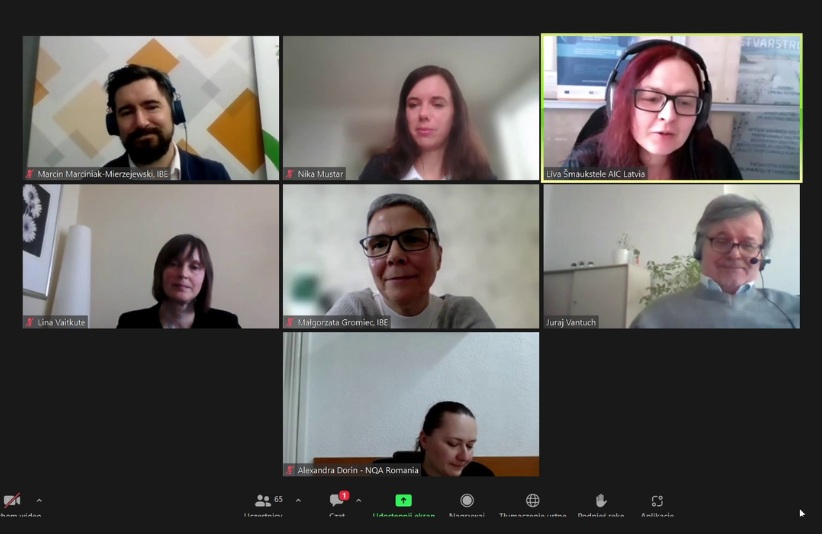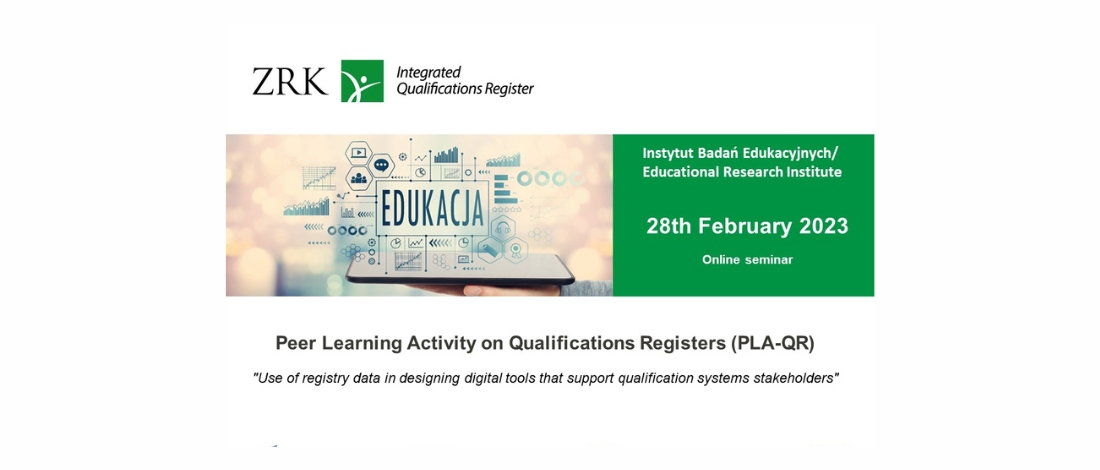In today's rapidly evolving educational landscape, the importance of qualification registers and databases cannot be overstated. These comprehensive repositories of qualification information play a crucial role in facilitating transparency, promoting mobility, and supporting informed decision-making for individuals, employers, and educational institutions. The recent PLA in Warsaw brought together experts from various countries to discuss the current state and future directions of qualification registers. Apart from the auditorium session centred around digital tools that leverage register data to empower stakeholders within qualification systems, one of the key highlights of the event was a panel discussion which featured panellists from Lithuania, Latvia, Slovakia, Slovenia, Romania, and Poland.
The panellists shared their diverse experiences and shed light on the current situation of qualification registers in their respective countries. The topics included types of data collected in the registers, methods used to present the data, possibilities of utilising the data, how the role of the registers in the respective countries changes as well as directions for development of the registers, and future plans. Below we present brief summaries of the panellists’ presentations.

Līva Šmaukstele, Latvia:
Latvian qualification database was developed to provide information on formal qualifications included in the Latvian qualification framework. The database includes only formal qualifications, and is not open to new types of qualifications outside of it. The primary role of the database is to provide information on all levels and learning outcomes, as well as the formal requirements concerning awarding bodies. The database provides an integrated, multi-level search tool, so the qualifications can be searched by multiple criteria. There is also a tool for the comparison of the qualifications side by side.The decision to create the database was made because information on formal qualifications was fragmented in Latvia, and the state register for qualifications was not fully open and lacked information on the Latvian Qualification Framework and European Qualification Framework levels. The database provides information in both Latvian and English, but the translation is still in progress. The database is primarily used by the end-users of the qualifications, including individuals from outside of Latvia seeking recognition of qualifications abroad or obtaining a particular qualification. The database is also used by ENIC NARIC experts.
Virgil Ion, Romania:
The National Qualification System is regulated by law, specifically the National Law of Education. The National Qualifications Registry is managed by the National Qualifications Authority (NQA). The register is not fully integrated, specifically lacking qualifications from adult education levels one to five which are managed by the Ministry of Labour in another register. Adult education qualifications level six and seven are included in the NQR because they are linked to tertiary education, which is the responsibility of the Ministry of Education. Level eight qualifications are not currently included in the register. Currently, the register contains approximately 7,000 qualifications and has an English version. It provides searchable information on diploma supplements for all the registered qualifications. The diploma supplement allows individuals to access information about competencies, and learning outcomes related to a specific qualification they obtained. It serves as a tool for individuals to explore new learning opportunities. All the qualifications in the registry will be linked to the competencies and occupations from ESCO (European Skills, Competences, Qualifications, and Occupations).
All qualifications in the register, including those from higher education, are based on occupational standards developed in collaboration between educational stakeholders and the labour market. The registry also provides links to partner institutions and universities offering the qualification. In the future the register will offer an end-application interface and API to enhance the functionality and accessibility.
Małgorzata Gromiec, Poland:
Polish integrated register is accessible online and provides most information without requiring registration or login. This includes qualifications within the integrated qualifications system, related institutions, awarding bodies, external quality assurance entities, and relevant ministers. However, there is also a part of the register that requires users to be logged in. This section is accessible to users who submit various types of applications, such as an application for including qualifications in the system, obtaining authorization to award qualifications, issuing certificates, and being listed as an external quality assurance entity. All applications are submitted electronically and registered users can find documents, instructions, news, announcements, and information on submitted applications and their status.
The qualifications included in the register must meet two requirements: having a formally assigned Polish Qualifications Framework (PQF) level and being described according to the regulations set in the Act on the Integrated Qualifications System. The register, by law, contains qualifications attained within the formal education system, including general, vocational, and higher education qualifications with assigned PQF levels. Qualifications from the formal education system are automatically included in the register. The information on higher education qualifications is obtained directly from the higher education database known as the Integrated System of Information on Science and Higher Education, or POLON via an interconnector tool.
The register also collects qualifications obtained outside the formal education system, including non-formal education and informal learning. These qualifications fall into three categories: postgraduate studies that meet PQF level requirements, regulated or statutory qualifications based on other laws and regulations (optional inclusion), and market qualifications. Market qualifications are not regulated by law and are driven by the market. They are developed by various entities such as industry associations, corporations, and training institutions. To include a market qualification in the system, an interested entity or institution submits an application to the relevant minister, who makes a decision based on a formal assessment. If the decision is positive, the qualification is published in the registry through an official announcement from the minister.
Juraj Vantuch, Slovakia:
In Slovakia there are three separate registers and portals that are unrelated to each other. This is due to the diverse history and purpose of these registers. The first register is associated with the qualification network, although it is currently undergoing reconstruction and is not fully operational. It contains about a thousand qualifications. The second register is specifically intended for individuals interested in starting a business but lacking qualifications. This register, known as the further education register, includes only 40 qualifications. These qualifications cover the necessary requirements for starting a business, as outlined in the relevant regulations. This register is established by law and falls under the control of the education ministry. The third register is called “the open occupational register”, and it consists of over 1000 occupational standards. This register primarily targets unemployed individuals and is part of a job portal. It provides an opportunity to explore job prospects. The development of an integrated portal is currently underway.
Nika Mustar, Slovenia:
The national qualification database comprises three types of qualifications: formal qualifications, vocational qualifications, and supplementary qualifications (market qualifications). These qualifications are included in the register after undergoing an accreditation procedure, as defined by relevant legislation. Data for different types of qualifications is gathered from various providers, such as the National Agency for Higher Education, the Ministry for Education, and the Institute for Vocational Education.
In terms of the register's usefulness and significance for different target groups, it goes beyond being a mere technical tool and provides added value with focus on four key target groups: individuals, including learners, students, and job seekers, can utilise the register to obtain a reliable and comprehensive overview of our qualification system, helping them find the most suitable educational path, career counsellors who disseminate information, and the register can serve as an essential career guidance tool by providing comprehensive information on qualifications and career development opportunities, employers who can access information on the competencies their employees acquire through obtaining specific qualifications, educational providers who benefit from the register as it serves as a platform to showcase their educational programs.
Lina Vaitkute, Lithuania:
In Lithuania, there are two types of qualifications: those defined in qualification standards and higher education qualifications, such as bachelor's and master's degrees. The National Register of Qualifications in Lithuania includes both types. The register is managed by The National Education Agency which collects data from various sources. The Qualifications and Development Center is responsible for qualification standards, while higher education institutions or the Agency for Higher Education quality handle higher education qualifications. To register qualifications, the relevant information is presented to the National Education Agency, which includes it in the register according to the established procedures. The digital register provides easy access to information about training programs and institutions that award qualifications. While the National Education Agency is responsible for managing and providing IT support for the register, the Qualifications and Development Center takes on content-related responsibility for vocational qualifications and qualification standards. Higher education institutions, on the other hand, are responsible for the content of higher education programs and qualifications included in the register. There are challenges regarding the quality of descriptions for higher education qualifications that need to be addressed.
Please note that the summaries provided in this document are unofficial and have not been authorised by the respective panellists/speakers.


